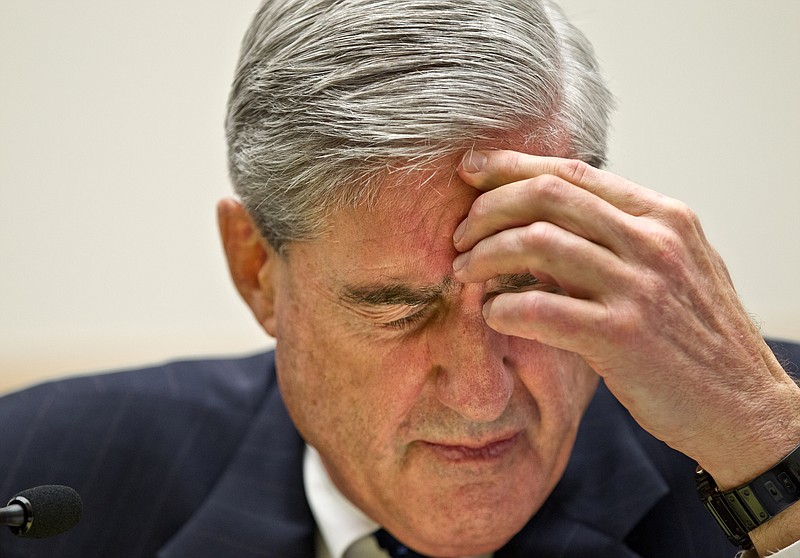The White House hunter is becoming the hunted - and for good reason.
What began as a probe of whether Russia colluded in the outcome of the 2016 presidential election has devolved into some members of the team doing the probing being revealed as biased or, at best, as anything but impartial.
Suddenly, Democrats who saw the investigation led by special counsel Robert Mueller as a way to nail President Donald Trump - but have been stunned at the lack of evidence - don't want to talk about it.
And calls - the Wall Street Journal and a CNBC columnist among them - are increasing for the special counsel to step down or a special prosecutor to be appointed to look into conflicts of interest between the FBI and the Justice Department.
We believe an investigation into any Russian meddling in our national election was warranted, but we're not surprised that partisans became - and are - involved. Remember that most of the calls for such an investigation came out of the shock and awe that Trump was elected president, from the bitter hate the result engendered in the losing side and from the cries it couldn't have been possible for Hillary Clinton to lose without something nefarious being involved.
The latest salvo came from the texts of Mueller's top investigator, counterintelligence agent Peter Strzok, who was shown to be highly critical of the president before joining what was supposed to be an impartial probe. Strzok was dismissed during the summer, but the bias revealed in his texts with the woman - an FBI lawyer - with whom he allegedly was having an extra-marital affair is shocking.
In them, he is shown to use profane language in his disgust over then-candidate Trump, to call him an idiot, to say he "is unable to provide a coherent answer," to suggest he (the agent) would be able to "protect our country at many levels" and to imply that some sort of "insurance policy" existed in the unlikely event that Trump won the election.
The same Strzok is the FBI official who downgraded the agency's assessment of Clinton's email mishandling (during her days as Obama secretary of state) from "grossly negligent" to "extremely careless." This change in then-FBI Director James Comey's report about Clinton made it easier to avoid prosecution for her actions.
Perhaps more devastating, though, is the theory now advancing that he was the individual who took possession of the largely discredited "Trump Dossier" from the Clinton campaign (some say helped create it), then went to the FISA court and passed it off as legitimate intelligence in order to obtain the necessary warrants to effectively spy on the Trump campaign.
For Mueller to have known about Strzok's bias and allowed him to join the team, or not to have known his previous involvement, strains incredulity. At the very least, his bias was known to the team long before it was reported.
But additional members of the investigative staff merit concern. One attended Clinton's election night party and reportedly praised an Obama administration holdover in her action against Trump. Another represented the individual who was responsible for helping set up Clinton's illegally used private email server.
In all, six of the 15 lawyers on Mueller's staff are connected with Clinton's campaign or to overtly partisan actions. Seven of the 15 have donated to Democrats or Democratic campaigns, including Clinton's. The rest have not made political donations. None donated to Trump.
"The public trust in this whole thing is gone," U.S. Rep. Jim Jordan, R-Ohio, said Thursday during a House Judiciary Committee hearing with Rod Rosenstein, the deputy attorney general, who oversees Mueller.
Nevertheless, the top Republicans involved in separate Russia probes from Mueller's have not called for the special counsel's head - yet. And Rosenstein said during Thursday's hearing he would fire Mueller only if he had just cause under Department of Justice regulations, and he said he didn't have just cause.
Meanwhile, a Trump spokeswoman said the president is not "discussing" firing Mueller, Trump's counsel said the president and Mueller send messages "back and forth," and a Mueller spokesman said the exchanges between the two are "very professional."
The American people should want to learn the breadth and depth of any Russian collusion in the 2016 election, but their appetite for partisanship in such an examination and their patience in the continued niggling around the edges is wearing thin.
Minus the probe finding anything serious, and sooner rather than later, a tainted, prolonged investigation is likely only to cause Trump supporters to dismiss any future charges as a witch-hunt and for Trump haters to term any vindication as a whitewash.
